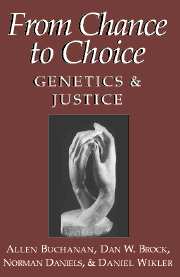Book contents
- Frontmatter
- Contents
- Preface
- CHAPTER ONE INTRODUCTION
- CHAPTER TWO EUGENICS AND ITS SHADOW
- CHAPTER THREE GENES, JUSTICE, AND HUMAN NATURE
- CHAPTER FOUR POSITIVE AND NEGATIVE GENETIC INTERVENTIONS
- CHAPTER FIVE WHY NOT THE BEST?
- CHAPTER SIX REPRODUCTIVE FREEDOM AND THE PREVENTION OF HARM
- CHAPTER SEVEN GENETIC INTERVENTION AND THE MORALITY OF INCLUSION
- CHAPTER EIGHT POLICY IMPLICATIONS
- APPENDIX ONE THE MEANING OF GENETIC CAUSATION
- APPENDIX TWO METHODOLOGY
- References
- Index
CHAPTER EIGHT - POLICY IMPLICATIONS
Published online by Cambridge University Press: 05 June 2012
- Frontmatter
- Contents
- Preface
- CHAPTER ONE INTRODUCTION
- CHAPTER TWO EUGENICS AND ITS SHADOW
- CHAPTER THREE GENES, JUSTICE, AND HUMAN NATURE
- CHAPTER FOUR POSITIVE AND NEGATIVE GENETIC INTERVENTIONS
- CHAPTER FIVE WHY NOT THE BEST?
- CHAPTER SIX REPRODUCTIVE FREEDOM AND THE PREVENTION OF HARM
- CHAPTER SEVEN GENETIC INTERVENTION AND THE MORALITY OF INCLUSION
- CHAPTER EIGHT POLICY IMPLICATIONS
- APPENDIX ONE THE MEANING OF GENETIC CAUSATION
- APPENDIX TWO METHODOLOGY
- References
- Index
Summary
Newly informed of the origin of species and the mechanisms of evolutionary adaptation, Galton and the original eugenicists sought to apply their knowledge for the salvation and improvement of society. But the road was bumpy, their vision fogged, and the route unclear; before long, there were victims, and eventually, in the cataclysm of the Nazi years, the entire enterprise crashed. Today, it is standard practice to repudiate not only their beliefs, their biases, and their methods, but also their values and aims.
For two generations, it has been taboo to discuss the application of genetic knowledge to the design, management, and improvement of society. In light of our greater sophistication about heredity, this kind of thinking seemed pointless; and given the experience of many people with eugenics, it also seemed very dangerous. Genetic scientists and clinicians alike instituted a new orthodoxy, a practice that focused narrowly on the medical and on the individual. Their role was to be confined to providing information (and later, therapy) according to the wishes of the individual patient or client and without any thought of the impact of a particular intervention on society at large, whether for good or ill.
The social perspective on genetics, however, will inevitably be revisited as the revolution in genetic science and medicine progresses. As genetics permeates our lives, as more and more people come into contact with genetic screening, testing, and, eventually, intervention, we cannot fail to appreciate the fact that these individual encounters have effects on others.
- Type
- Chapter
- Information
- From Chance to ChoiceGenetics and Justice, pp. 304 - 346Publisher: Cambridge University PressPrint publication year: 2000
- 1
- Cited by



